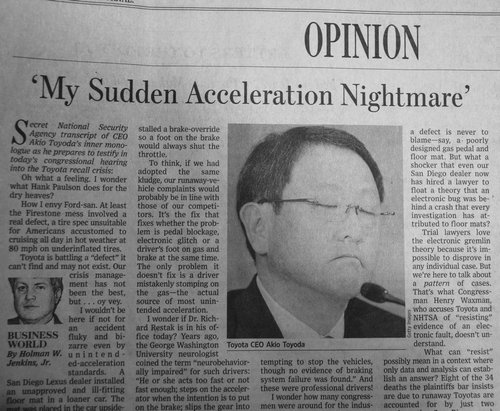Yes! Michael Kinsley in The Atlantic explains how newspaper writers could do better by making their articles shorter, leaving out extraneous fluff that doesn’t inform. Among the fluff is the quoting of experts or other anonymous persons so the reporter can pretend to be reporting instead of opinionating.
But there is another type of fluff that Kinsley didn’t mention. It’s the ways some newspapers now report as fact things that they have no possible way of knowing.
To find an example or two, I went to the WSJ and searched for the word “fear.” One item that came up was a January 4 article titled “Celebrating a Year of Highs and Lows.” Here are some of the examples from the article of what I’m talking about, interspersed with my comments.
Wall Street lived, thanks in large part to Main Street. Hundreds of billions of dollars in taxpayer money helped nurse the financial system back to relative health, with the country’s biggest banks paying back the government rescue aid by year’s end. But executives’ outsize compensation stood in contrast to an unemployment rate that topped 10%.
We don’t know that. We know there were billions of dollars in taxpayer money, and we know the financial system still lives. But we don’t know that the system is healthy. Nor do we know that any health it might have is due to taxpayer money. It’s far too early to know such a things.
And speaking of contrasts, why point out the contrast between executive compensation and unemployment without mentioning the contrast between unemployment and the so-called health of the financial system?
Barack Obama was inaugurated president and set off on an ambitious agenda to remake health care, reform the financial system and reclaim the U.S.’s standing on the world stage. The bear turned into a bull and the Dow industrials reclaimed 10000 in October. Recession probably ended late in the year as global stimulus efforts bore fruit. US Airways Capt. Chesley “Sully” Sullenberger was a hero with “the Miracle on the Hudson” in a year of sex scandals, reality-TV stunts and financial schemes (alleged and proved) stealing headlines.
Global stimulus efforts bore fruit? Some people would like to think so, but we don’t know that.
On the world stage, Iran and Afghanistan reelected leaders under clouds of suspicion and violence. Pyongyang tested nuclear weapons, while many countries suspect Tehran wants them. China flexed its muscles on climate change, currency and a host of other issues as it assumed a more prominent role in global affairs.
China flexed its muscles? Without inside information we don’t know that’s what China was doing, metaphorically or otherwise.
Fiscal and debt burdens came to bear in Dubai and Greece. Terror still raged in Iraq, Afghanistan and, in the year’s waning days, in the air, as an alleged bomber tried to take down a Christmas Day flight.
Even though news reporters tell us about lots of things they have no way of knowing, there are others they are not quite so sure about. Hence the word “alleged.” BTW, if they’re going to say “alleged”, wouldn’t it be better to say, “a passenger allegedly tried to take down a Christmas Day flight”? And wouldn’t it be better to say that China allegedly flexed its muscles, or that a global stimulus allegedly nursed the financial system back to relative health?
Bank of America completed its $19.36 billion purchase of Wall Street firm Merrill Lynch, becoming the largest U.S. bank by assets, as the worst financial crisis since the Great Depression continued to reshape the U.S. banking industry. The deal would haunt BofA throughout the year.
Haunt? Newspapers are now reporting on hauntings?
The U.S. transferred control of the Green Zone to Iraqi authorities and handed back Saddam Hussein’s former palace.
Oops. Here’s a counter example showing that news reporters are capable of reporting on things that can be reasonably known.
The Dow industrials posted the worst Inauguration Day performance ever, falling 332.13 points, or 4%, to 7949.09, amid fears the government would need to nationalize the most deeply wounded banks. But the next day, stocks jumped 279.01, or 3.5%, to 8228.10.
Amid fears? What does that word “amid” mean? Is the WSJ trying to make a cause-and-effect conclusion on the sly?
General Motors surrendered its crown as the world’s biggest auto maker to Toyota Motor after 77 years. The Detroit company was struggling to stay afloat with loans from the U.S. government.
The auto companies are competing for a crown? I had thought they were competing for customers. No wonder they are in trouble.
John Thain agreed to step down from a top job at Bank of America after CEO Kenneth Lewis, angry about the way the former Merrill chief handled losses and bonuses at Merrill, asked him to resign.
We don’t know whether or not Kenneth Lewis was angry. People in the public eye fake anger all the time. They also fake contentment and delight. Since we don’t know, why not say, “allegedly angry”?
Microsoft said it planned to cut 5,000 jobs, stunning employees and investors.
Did the WSJ conduct a poll of employees and investors to see if they were “stunned”? Did any of them act stunned?
Iceland’s government collapsed amid popular anger over a financial crisis that gutted the economy.
There’s that sneaky word “amid” again.
President Obama blasted Wall Street for bonuses he called irresponsible and shameful.
See, here’s an example of the honest way to report these things. President Obama may or may not have been angry. He may have felt the bonuses were irresponsible, and maybe he didn’t. We don’t know those things. But we do know that he blasted Wall Street, and he do know how he described the bonuses. Good job by the WSJ reporters on this one.
Big-bank CEOs endured a seven-hour barrage of questions from House lawmakers, angry over executive pay and lending.
Endured?
New York Attorney General Andrew Cuomo said Merrill Lynch secretly moved up its date to award bonuses, giving $1 million or more apiece to nearly 700 employees. In March, it was reported that as Merrill staggered in 2008, 11 executives were paid more than $10 million each in cash and stock, and 149 others got $3 million or more.
Staggered?
The government’s plan to overhaul its $150 billion bailout of American International Group relaxed loan terms and wiped out interest. It was a nearly complete reversal from the plan first laid out in September. Later in the month, some AIG employees returned bonuses or said they would do so amid public outrage. And the insurer said roughly two-thirds of the $173.3 billion in aid it received went to trading partners in the U.S. and abroad.
Amid?
The Dow industrials fell 79.89 points, or 1.2%, to 6547.05 as tech stocks dragged major indexes to fresh bear-market lows on economic concerns. But four days later, the stock market had managed to post its best week since November, up 597.04 points, or 9%, to 7223.98, as scattered bits of good news gave some reason to believe that the economy might be closer to a bottom.
“Some” had reason to believe? The reporter who wrote this needs to read Michael Kinsley’s article.
Bernard Madoff was sent to jail after confessing to an epic fraud, his decades-long Ponzi scheme that cost investors billions, saying he was “sorry and ashamed” for bilking so many out of their life savings.
Madoff used the word epic? Or did he just confess to fraud? By the way, I like the way the words “sorry and ashamed” were put in quotes. Maybe the reporters should use those things more often when our nation’s leaders say things, especially given that they, too, have bilked us out of billions of dollars.

